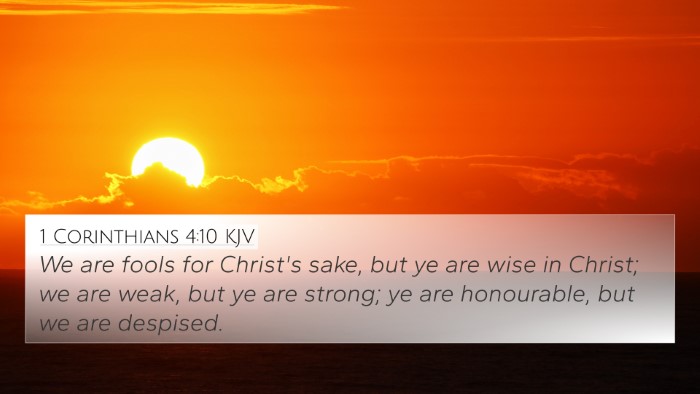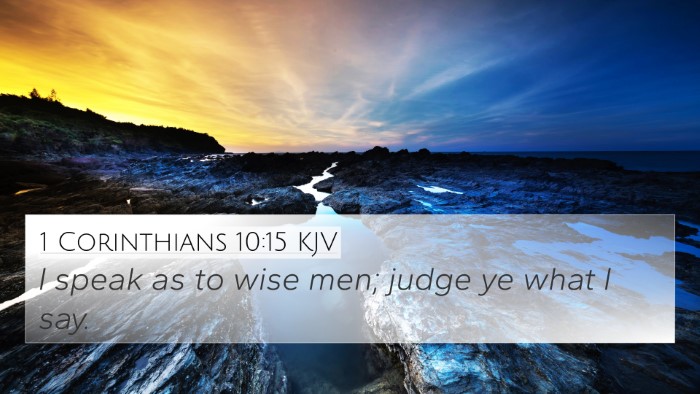Understanding 2 Corinthians 11:19
2 Corinthians 11:19 states: "For ye suffer fools gladly, seeing ye yourselves are wise." This verse holds profound implications about the nature of wisdom and folly, with particular emphasis on the relationships between believers and false teachers.
Meaning and Interpretation
This verse draws attention to the irony of wisdom as perceived by the Corinthians. Through the combined insights of Matthew Henry, Albert Barnes, and Adam Clarke, we can explore deeper meanings behind this scripture.
-
Matthew Henry's Commentary:
Henry indicates that the Corinthians, in their acceptance of false teachers, demonstrate a form of folly. It reflects a blind trust in their own wisdom while ignoring the truth of the Gospel. He believes that this verse serves as a rebuke, challenging the Corinthians to rethink their criteria for wisdom.
-
Albert Barnes' Commentary:
Barnes focuses on the acceptance of “fools,” suggesting that the Corinthians are vulnerable to being deceived by those presenting false claims. He emphasizes that their suffering of such folly highlights their misguided understanding of true wisdom, encouraging them to seek genuine spiritual discernment.
-
Adam Clarke's Commentary:
Clarke suggests that the Corinthians were so enamored with their own perceived intellect that they welcomed false teachings. This arrogance, he notes, can lead to spiritual deception, as their willingness to endure fools blinds them to the danger these teachings pose to their faith.
Bible Verse Cross-References
2 Corinthians 11:19 connects to several other passages that explore themes of wisdom, truth, and discernment:
- 1 Corinthians 3:18-19: "Let no man deceive himself. If any man among you seemeth to be wise in this world, let him become a fool, that he may be wise." – A direct commentary on the wisdom of the world versus the wisdom of God.
- 2 Thessalonians 2:3-4: "Let no man deceive you by any means: for that day shall not come, except there come a falling away first..." – Identifying the danger of being misled.
- Proverbs 1:7: "The fear of the Lord is the beginning of knowledge: but fools despise wisdom and instruction." – Contrasting the wise and foolish.
- Proverbs 26:4-5: "Answer not a fool according to his folly, lest thou also be like unto him. Answer a fool according to his folly, lest he be wise in his own conceit." – The complexities of engaging with foolishness.
- James 1:5: "If any of you lack wisdom, let him ask of God, that giveth to all men liberally, and upbraideth not; and it shall be given him." – An encouragement to seek divine wisdom.
- Romans 16:18: "For they that are such serve not our Lord Jesus Christ, but their own belly; and by good words and fair speeches deceive the hearts of the simple." – A reminder of the dangers posed by deceptive teachings.
- 1 John 4:1: "Beloved, believe not every spirit, but try the spirits whether they are of God..." – A call for discernment regarding spiritual teachings.
- Colossians 2:8: "Beware lest any man spoil you through philosophy and vain deceit, after the tradition of men, after the rudiments of the world, and not after Christ." – Warning against worldly philosophies that can lead believers astray.
- 2 Peter 2:1-3: "But there were false prophets also among the people, even as there shall be false teachers among you..." – Affirming that false teachings have existed and will continue to arise.
- Philippians 1:9-10: "And this I pray, that your love may abound yet more and more in knowledge and in all judgment; That ye may approve things that are excellent..." – Encouraging growth in discerning excellent things, rooted in knowledge.
Connections between Bible Verses
The verse serves as a focal point for understanding broader themes of wisdom versus folly, as illustrated through other scriptures. By examining these connections, we gain a richer understanding of the message Paul imparts to the Corinthians. This focus on the dynamics between wisdom and folly resonates throughout the Bible, facilitating a comparative Bible verse analysis to enhance our comprehension of God's word.
CROSS-REFERENCING BIBLICAL TEXTS
The practice of cross-referencing Biblical texts allows for deeper insights into the underlying messages contained within scripture. By employing Bible verse parallels between verses like 1 Corinthians 3:18-19 and James 1:5, we can better grasp the essence of spiritual wisdom and the dangers of being swayed by misleading teachings.
Thematic Bible Verse Connections
Each referenced verse serves as a window into a larger conversation regarding faith, understanding, and discernment within the Christian community. Thematic connections can lead to a comprehensive Bible cross-reference study that delves into the core teachings of both the Old and New Testaments, highlighting the unity and continuity of scripture.
Practical Application of the Verse
In applying the principles found in 2 Corinthians 11:19, believers are encouraged to:
- Seek true wisdom through prayer and Scripture study.
- Engage in discernment when confronted with teachings that stray from Biblical truth.
- Utilize tools for bible cross-referencing to deepen their studies and understanding.
- Commit to a humble approach that acknowledges the limits of human wisdom.
- Foster community dialogue centered around correcting and guiding one another towards the truth of the Gospel.
Conclusion
In summary, 2 Corinthians 11:19 serves as both a warning and a lesson on the value of true wisdom. As believers, it is our responsibility to be vigilant, to cross-reference and understand scripture deeply, and to grow in discernment. By doing so, we can avoid the pitfalls of folly and adhere firmly to the teachings of Christ, fostering a robust faith that withstands the influences of falsehood.






